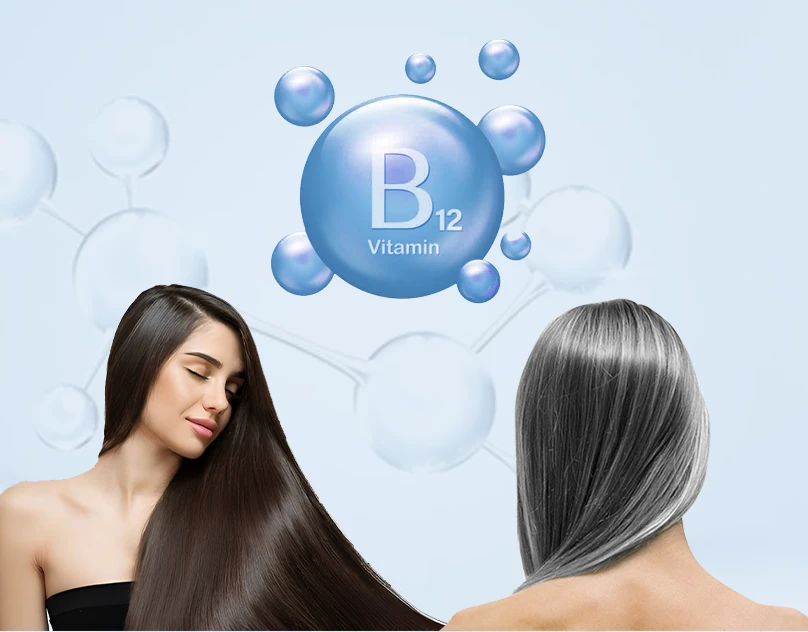

How To Prevent White Hair With Strategies and Genetic Insights
As people age, the appearance of white hair is just so natural part of life. However, for numerous people, the sight of silver strands that shall arrive prematurely can be a source of concern.
To know more, understanding genetics is to play a significant role; various other factors contribute to this phenomenon.
The good news is that understanding some of such factors and making several informed lifestyle choices can help in preventing or slowing down the onset of white hair.
Understanding White Hair and The Science Behind It
For any person, their Hair colour is determined by melanin. It is a pigment produced by specialized cells known melanocytes. They are located the hair follicles.
There are two main types of melanin like eumelanin (which is a dark pigment, highly responsible for black and brown hair) and pheomelanin (reddish-yellow pigment, which is responsible for red and blonde hair).
Such mentioned unique combination and amount of such pigments shall create the vast spectrum of human hair colours.
With age the activity of melanocytes can gradually lower. This action can lead to reduction in melanin production. It shall further appear as white or grey. While the average age for hair to start greying might vary person to person. Some individuals experience such change much earlier, which is a condition known as premature greying.
Factors Contributing to White Hair
While aging is known as the primary driver, various elements can influence as when and how quickly the hair can turn white:
- Genetics: This is arguably calculated as the most significant factor. When parents or grandparents might have experience premature greying, you shall acquire it too. There are various studies that have identified specific genes like the IRF4 gene. It is all well linked to the timing of such hair whitening like condition. This genetic predisposition shall also mean about the body’s “melanogenic clock” maybe it is set to slow down some of the melanin production mentioned earlier.
- Oxidative Stress: Our bodies are highly responsible for constantly producing those free radicals.
This production can further damage the melanocyte cells, which impaired the ability to produce pigment. Some of the factors that are contributing to oxidative stress are mentioned below:
- Pollution: Exposure to environmental pollutants can generate free radicals.
- UV Rays: Excessive amount of sun exposure might lead to oxidative damage.
- Emotional Factors: Such chronic stress like factors can enhance the oxidative stress present in the body.
- Nutritional Deficiencies: Lack of essential vitamins and minerals can simply significantly those impact hair health and colour.
- Vitamin B12: Deficiency in this vitamin is known to be a common cause of premature greying. As it is known to all Vitamin B12 is needed for the red blood cell formation. It helps with nervous system health, both of which can impact that hair follicle health.
- Vitamin D: This Vitamin D is known to play major role in stimulating new and old hair follicles.
- Biotin (Vitamin B7): On knowing for hair growth, biotin can also support the overall health of hair follicles, shall contributing to colour maintenance.
- Copper: Such mineral is known to be crucial for melanin production. Low copper levels are well linked to some sort of premature greying.
- Iron: Iron deficiency can lead to disruption of blood supply to those hair follicles. This shall impact melanin production.
- Zinc: The mineral helps in protecting cells and DNA. They further can regulate hormonal balance to influence hair aging.
- Folate (Vitamin B9): Important for metabolic and DNA functions, the Vitamin B folate can contribute to overall hair health.
- Stress: Condition like while hair has already grown out and it will not change its colour. Some high levels of stress can simply affect the melanocyte stem cells within the hair follicle.
There is various research that do indicate about some stress hormones, particularly noradrenaline. They can lead to some stem cells which shall activate and migrate away from their reserve. Action like this can lead to a permanent loss of pigment-producing cells in that follicle.
It can essentially mean new hair growing from that follicle will result to be white.
- Smoking: There are various studies that have all shown a strong link between smoking and early onset of condition related to white hair. The free radical damage which is caused by smoking is believed to harm some of the hair follicle’s ability to produce melanin.
- Medical Conditions: Premature greying can be trigged with several medical issues mentioned below:
- Thyroid Disorders: It includes conditions such as hyperthyroidism or hypothyroidism. They are to affect melanin production, just as thyroid hormones which can directly influence some hair follicles.
- Autoimmune Diseases: Conditions like vitiligo (where melanin-producing cells are well attacked) and alopecia areata can lead to several hair to turn white.
- Pernicious Anemia: Mentioned issue is well characterized by an inability to absorb enough amount of Vitamin B12. This shall usually \manifests with symptoms like hair colour alteration.
- Chemical Hair Products and Environmental Factors:
Making frequent use of some harsh chemical hair products (including dyes or bleaches) shall be harmful. On the other hand, being exposed to environmental stressors, including pollution and UV radiation, can also damage melanin cells. This goes along with accelerating the greying process.
How to Prevent White Hair?
While reversing genetically predetermined greying of the hair is just not possible. On the other hand, there are various strategies which can help to prevent, or it shall delay the onset of white hair and helps in sustain overall hair health.
Choose A Nutrient-Rich Diet
Choosing a balanced diet, which is rich in essential vitamins and minerals, it is fundamental for healthy hair.
All Those B Vitamins:
- Vitamin B12: Which is found in meat, eggs, fish, dairy products, and fortified cereals. For vegetarians and vegans, nutritional yeast and fortified plant milks are preferable.
- Biotin: It is found in nuts, eggs, sweet potatoes, seeds, and avocados.
- Folate (Vitamin B9): Include more of leafy green vegetables, legumes, and fortified grains.
- Vitamin B6: Obtain on using poultry, potatoes, fish, and non-citrus fruits.
- Minerals:
- Copper: Incorporated in foods including oysters, beef liver, nuts, whole grains, dark chocolate, and mushrooms.
- Iron: Rich sources present in poultry, red meat, fortified cereals, dark leafy greens, lentils, and beans.
- Zinc: Oysters, poultry, beef, beans, nuts, and dairy products has it in good, needed amount.
- Selenium: The things holding this component are brazil nuts, halibut, tuna, sardines, and shrimp are good sources.
- Antioxidants: Helps to combat oxidative stress, which is a load up on antioxidant-rich foods:
- Fruits: Citrus fruits, berries, and those dark grapes.
- Vegetables: Kale, spinach, broccoli, bell peppers, and red/orange carrots.
- Other: Dark chocolate, green tea, and fresh herbs and spices.
- Protein: Know that your hair is made of keratin, which is also a protein. Hence, ensure adequate protein consumption from sources such as fish, lean meats, eggs, dairy, legumes, and nuts.
Manage Stress Effectively
Given the proven link that is present between stress and premature greying, adopting stress-management techniques is need of the hour.
- Mindfulness and Meditation: Practicing some of the mindfulness or performing meditation daily can help in calming the nervous system.
- Yoga and Exercise: Performing physical activity is known to be a great way for releasing tension and lowering stress hormones.
- Adequate Sleep: Aim for approx. 7 to 9 hours of quality sleep each night to allow the body to further repair and rejuvenate.
- Hobbies and Relaxation: You are to engage in several activities you might enjoy for unwinding and de-stress like condition.
- Seek Support: While being stressed you might feel overwhelmed. This is when you must consider speaking to a therapist or some counsellor.
Adopt Healthy Lifestyle Habits
Beyond following a disciplined diet and stress, overall lifestyle choices can also impact the hair health.
- Quit Smoking: Act of smoking significantly contributes to oxidative stress and premature white hair. Quitting this hazardous habit is one of the most impactful steps to take for health of hair and overall health.
- Limit Alcohol Use: Excessive intake of alcohol can also contribute to nutrient deficiencies and oxidative stress like condition.
Protect The Hair:
- UV Protection: Shield the hair from excessive exposure to the sun by wearing hats or making use of some UV-protective hair products.
- Gentle Hair Care: Do not choose any harsh chemical treatments, as excessive heat styling, and tight hairstyles can damage hair follicles. Making use of some mild, sulfate-free shampoos and conditioners is highly recommended.
- Avoid Using Hot Water: Wash your hair with lukewarm water. This will help to prevent stripping off those natural oils.
- Regular Scalp Massage: Massaging the scalp regularly can enhance blood circulation to the hair follicles. This shall promote nutrient delivery and overall health.
Consider Natural Remedies
While scientific evidence for numerous natural remedies is limited, some of the individuals shall also find them beneficial in supporting hair health. This can help in as a potential answer to how to prevent while hair. Always make sure about patch-test which is the new remedies, and you are to consult with a healthcare professional before relying solely on them.
- Amla (Indian Gooseberry): This gooseberry is known to be rich in Vitamin C and antioxidants. Amla is believed to boost those melanin production for the hair growth.
- Curry Leaves: It is high in Vitamin B, curry leaves which shall be thought to help in restoring melanin pigment. Boiling some of the curry leaves might be in the coconut oil until it shall turn black and then massaging such mixture into the scalp which is a popular remedy.
- Black Tea: A black tea can simply rinse which is believed to be rich in antioxidants. This further helps in promoting healthy hair growth and potentially it can add a temporary tint.
- Onion Juice: It contains catalase, which is an enzyme to break down hydrogen peroxide. This can be about bleached hair. Applying onion juice right to the scalp is a traditional way to know how to prevent white hair.]
LifeCode’s Genetic Testing Kids At Rescue
Understanding genetic predispositions can be a powerful tool. It can help in addressing and preventing white hair. Genetic testing is known to offer insights into the unique genetic makeup. This act can help in identifying factors that shall further contribute to premature white hair.
How Does These LifeCode’s Genetic Tests Work
Genetic testing for hair colour or hair health typically involves analysing some genes which are known to play a role in melanin production. They also work over oxidative stress response, nutrient absorption, and hair follicle health. It is usually done through a simple and non-invasive sample like a saliva swab.
Once collected, the DNA sample is well analysed in a laboratory. This helps in identifying variations or mutations in relevant genes. For instance, testing might also look at genes like IRF4. This shall influence the timing of hair greying, or genes which are related to how the body shall process some of the key vitamins and minerals.
Accuracy and Reliability of LifeCode’s Tests
Lifecode is a leading platform for genetic insights. The help prides itself on providing accurate and reliable genetic tests.
They claim to utilize cutting-edge genomics technology, and it helps in employing a team of expert researchers and geneticists. It helps to ensure precise and insightful genomic analyses.
- Scientifically Validated Markers: The LifeCode tests are to focus on genetic markers that have been extensively studied and validated in scientific literature for their association with hair characteristics. They include pigmentation and overall health.
- High Precision Rates: On striving for precision rates of 99.9% in the genomic analysis, LifeCode is committed to provide with highly dependable outcomes.
- Comprehensive Analysis: The genetic tests are to cover a broad range of genetic factors that are all related to hair health. They do include predispositions to premature greying, hair thinning, hair cycle defects, and some diet-associated conditions.
- Confidentiality and Security: The genetic testing help results adhere to strict protocols for data privacy and security. They are to ensure genetic information while handling the utmost confidentiality.
LifeCode’s Invitation:
The journey to healthier, more vibrant hair starts with understanding your unique biology. Don’t leave your hair health to chance; take the first step with genetic testing for hair through LifeCode.
LifeCode invites you to:
Book a genetic consultation,
where experienced genetic counsellors will explain how your genes affect your hair health and offer personalized advice tailored just for you.
- Order a genetic testing kit (swab test):
The convenient at-home swab test, which is available through Lifecode, can help you to easily collect your DNA sample and receive a comprehensive report with insights into your genetic predispositions. This goes well for hair health factors, which are related to white hair.
Empower yourself with certain knowledge and you can make some informed decisions for your hair’s future.

Can You Inherit Migraine Risk The Truth About Women’s Brain Health
Can You Inherit Migraine Risk The Truth About Women’s Brain Health The Genetic Link to Migraines, It Is More Than Just Bad Luck Why Women are More...


Unlocking Your Body’s Blueprint: Genetic Clues to Pregnancy Complications and Hypertension
Unlocking Your Body's Blueprint: Genetic Clues to Pregnancy Complications and Hypertension The Intricate Dance of Genes and Health Decoding Pregnancy Complications Through Genetics The Genetic Roots of...

Education: Bachelor of Pharmacy (B.Pharm) from the Tata Institute of Social Sciences (TISS), Mumbai Experience: Agarwal is a seasoned pharmacist with over 7 years of experience in the pharmaceutical field. She has worked in various settings, including hospital pharmacies and community clinics, where she has excelled in medication management, patient counseling, and clinical support. Agarwal is known for her expertise in drug therapy optimization and patient safety. In addition to her practical experience, she contributes to health journalism, focusing on pharmaceutical advancements and health policy, and is involved in research projects aimed at improving medication practices and health outcomes. is known for her expertise in drug therapy optimization and patient safety. In addition to her practical experience, she contributes to health journalism, focusing on pharmaceutical advancements and health policy, and is involved in research projects aimed at improving medication practices and health outcomes.


